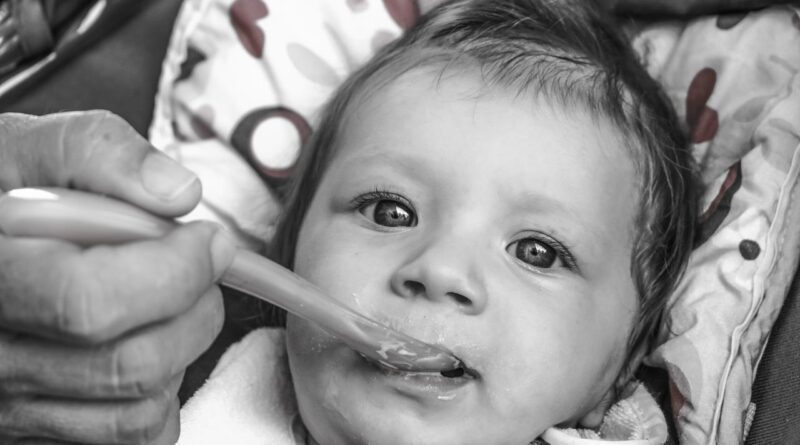Spitting Up In Babies: Causes And Ways To Stop It
Every baby spits up once or twice throughout the first few years of life. Spitting up is natural and anticipated, despite the fact that it may seem alarming to see your baby doing it. You may wonder if your baby is actually keeping enough breast milk or formula.
More infants will spit up than others. What, if anything, can you do to lessen the amount, then? How do you tell whether your baby’s symptoms are a symptom of anything more serious? Read on to this article to know more about the causes of spit up in babies and how to reduce it.
Why is my baby spitting up?
Spitting up on a baby, or the occasional drip of stomach contents after feeding, is messy and annoying. and entirely typical. Spit ups happen when babies swallow too much air while they’re sleeping. They also have trouble swallowing because their throats aren’t fully developed yet.
How do I know if my baby is spitting up too much?
It may indicate a more serious issue if they go from being a cheerful spitter to spitting with more force or volume than before. Additionally, a baby’s irritability may indicate a stomach discomfort or acid reflux that is hurting their oesophagus if they are crying more frequently than usual.
Also Read: How To Make Baby’s Skin Fair?
What Causes Spitting Up In Babies?
Babies spit up because they’re trying to clear their airways of swallowed liquids. The most common cause of this behavior is reflux disease, which occurs when stomach acid backs up into the esophagus.
The Gag Reflex
The gag reflex is an involuntary response that occurs when something enters the back of the throat. This reflex helps protect against foreign objects entering the body through the esophagus. However, it can cause discomfort and even vomiting if it happens too often.
Reflux is more common in infants than older children. It’s also more likely to occur during the first few months after birth. If you notice your baby has been spitting up frequently, talk with your doctor about possible treatment options.
Saliva Production
Saliva production is controlled by the parotid glands located near the ears. These glands produce saliva as part of the digestive process. They also help maintain the moisture balance in the mouth. If a baby has trouble swallowing, he or she might spit up because there isn’t enough saliva in his or her mouth. This happens when the parotid gland produces too much saliva. It’s called excessive salivation.
Breastfeeding
Is My Baby’s Spitting Up After Feedings Normal? Babies occasionally spit up as a result of overeating, burping, or drooling. Because their digestive systems are still developing, many newborns will spit up a bit after some, or even all, feedings or during burping. That is entirely normal.
Maternal Diet
A mother’s diet during pregnancy affects how well her child will digest food later in life. Breastfeeding helps prevent allergies and asthma.
Burp Your Infant More Often
The presence of extra gas in your baby’s tummy can cause problems. Gas bubbles have an irritating propensity to lift the contents of the stomach with them as they exit. Burp both before and after meals to lessen the likelihood that this will occur.
Limit Active Play After Feeding
After meals, refrain from strenuous play and keep your infant upright. After feeding, pressing on a baby’s tummy increases the likelihood that anything in his stomach will be made to move. While delaying stomach time after meals might be a simple and successful avoidance strategy, tummy time is crucial for babies.
Also Read: Breastfeeding vs. Formula Feeding – Which Is Better?
How To Stop Spitting Up in Babies?
Baby spit ups are usually harmless, but they can cause discomfort and even pain for baby. Here are some tips on how to prevent and treat spit ups.
Don’t Give Them Too Much Air
Try to prevent spitting up by avoiding feeding your baby during naps. This will help him or her sleep through the night without waking up. Third, use a pacifier to soothe your baby’s throat. Fourth, try using a humidifier to help reduce the chances of getting sick. Finally, call your doctor if your baby continues to spit up after trying these tips.
Try Giving Them A Little Milk Before Bedtime
If your baby still spits up at bedtime, try giving them a little milk before going to sleep. It might make them feel better and give them something else to focus on besides the spit up.
Offer Water Instead Of Juice Or Soda
If your baby has been spitting up a lot lately, offer water instead of juice or soda. This will help keep them hydrated and prevent dehydration.
Let Them Sleep In The Same Position As You Do
Try putting your baby down in the same position as you do at night. This helps them learn how to sleep through the night without waking up.
Also Read: Top 10 Food Ideas For 12 Months Babies
How to help them get better at spitting up?
If your baby has spit ups, try these home remedies to make them feel better. First, keep an eye out for signs of dehydration. A dry mouth and tongue are common symptoms of dehydration. You can give your baby water by holding his or her head under running water until he or she drinks. Also, avoid giving your baby foods with thick textures, such as purees, because they can block the esophagus. Instead, offer soft foods like mashed bananas, applesauce, or yogurt.
Also Read: Baby Formula Feeding Chart
Feeding your infant before he or she becomes too hungry is the greatest approach to lessen spitting up. When your infant pauses between feedings, gently burp your child. After meals, limit energetic play and keep your infant upright for at least 20 minutes. Always keep a watchful eye on your infant throughout this period.

